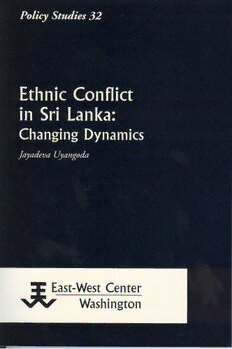
Ethnic Conflict in Sri Lanka: Changing Dynamics (Policy Studies) PDF
92 Pages·2007·0.337 MB·English
Most books are stored in the elastic cloud where traffic is expensive. For this reason, we have a limit on daily download.
Preview Ethnic Conflict in Sri Lanka: Changing Dynamics (Policy Studies)
Description:
Sri Lanka's ethnic conflict has become protracted and intractable. The twenty five- year-old civil war has been interrupted numerous times for a negotiated peace and political settlement, yet the conflict has defied deescalation. All failed attempts at negotiated peace have propelled the civil war forward with greater vitality and intensity. Both war and peace appear to be mutually sustaining dimensions of a single process of conflict produced and sustained by two defining dynamics: (1) intense competition for state power between state-seeking minority nationalism and state-asserting majority nationalism; and (2) the fact that the ethnic war has acquired relative autonomy from the political process of the ethnic conflict. Against this backdrop, attempts at negotiated settlement, with or without ceasefires, have not only failed but have redefined the conflict. This study suggests that early deescalation or a long-term settlement is not possible at present. A protracted conflict requires a protracted process of political transformation. Since the question of state power is at the core of the conflict, a credible short-term path to peace should begin with negotiations that aim at, and lead to, reconstituting state power along ethnic lines. This will require a grand ethnic compromise among Sinhalese, Tamil, and Muslim elites, backed by the people in the three main ethnic formations.
See more
The list of books you might like
Most books are stored in the elastic cloud where traffic is expensive. For this reason, we have a limit on daily download.
